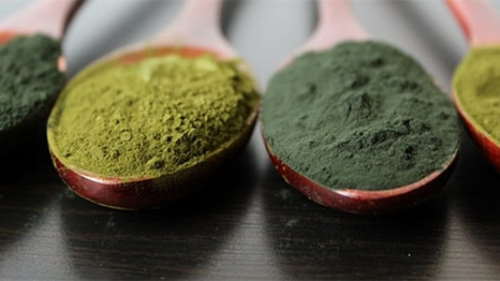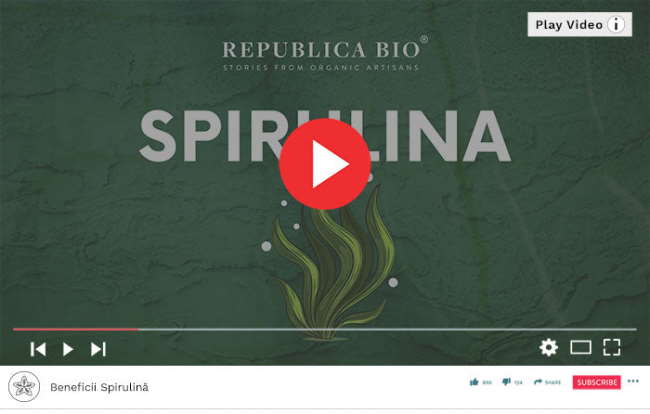Many foods make appearances on the “Superfood Hit List”. Turmeric, coconut oil, kale, butter… (Hey, they all deserve it!) Yet, one blue-green alga is making its way up that list, too. The thought of eating algae may make you cringe — especially when it’s hard enough to get your kids to eat their vegetables! Once you learn the amazing health benefits of spirulina, you may just declare yourself its newest fan. Spirulina is a nutrient-dense bombshell that’s earned its superfood status. Is it the most nutrient-dense food on the planet.
The Origins Of Spirulina
Historians discovered references to spirulina as a food source for the Aztecs right up until the 16th century. The Aztecs referred to it as tecuitlatl, and it grew in abundance in Lake Texcoco. Then spirulina sort of dropped off the radar. Further mention of spirulina in medical literature didn’t occur until the 1960s. During his travels through Africa, botanist Jean Leonard discovered tribal folk in Chad, Africa, selling dried cakes of blue-green algae they called dihé’ (source). They were using these cakes as a base for broths and soups. Through further analysis, Leonard discovered the algae to be none other than spirulina. In 1966, Leonard went on to conduct the first scientific study of spirulina at a Sosa-Texcoco production facility in Mexico. This study established the groundwork for spirulina cultivation. From this, the International Association of Applied Microbiology hailed it as a wonderful food source. They recognized its potential use “as a food supplement, food additive, animal or aqua feed and to combat against all forms of Protein Energy Malnutrition (PEM) and Protein Energy Wasting (PEW)”. A strengthening body of scientific evidence to support its health benefits has led to its more common uses in health foods. These include bliss balls, protein bars, smoothies, shakes, and as a standalone health food supplement. Let’s take a deeper look at why spirulina is stealing the spotlight in the health food realm.
What Is Spirulina?
Spirulina is an ancient form of blue-green algae that thrives in natural alkaline lakes. Unlike many other plants, spirulina is a largely self-sufficient survivor. Spirulina has an incredible ability to thrive even with large variances in temperature and neglect. Under such conditions, many other plants would die. By virtue, spirulina absorbs trace minerals from the water in which it grows. Naturally, the healthier the environment, the more nutrient-dense the spirulina. The reverse is also true; spirulina absorbs toxins from its growing environment. Take caution when sourcing spirulina to ensure that it hasn’t been grown in contaminated waters.
Potential Health Benefits Of Spirulina
Over of 1,400 studies have been conducted on spirulina. What does this say about the health-promoting potential and value of such seemingly insignificant algae? Like other plants, spirulina converts sunshine into bio-available nutrients and carbon dioxide into oxygen. There’s something far more powerful going on within spirulina’s cell walls because the final product packs one intense nutrient punch. In fact, it has widely been recognized as the most nutrient-dense food on the planet! When compared with other foods gram for gram, spirulina lives up to this claim.
The Most Nutrient-Dense Food On Earth
Analyses show just 1 tablespoon (7 grams) of dried spirulina powder contains the following impressive nutrients: High In Protein Spirulina contains complete protein, unlike many plant foods. Around 65% of spirulina is a complete protein. A complete protein is one which contains all the essential amino acids the body needs in a bio-available form. High In Carotenoids & Antioxidants Spirulina contains 10 times the amount of beta-carotene (the plant-based precursor to Vitamin A) than carrots. Carotenoids and antioxidants are known for helping to prevent cell damage. Bursting With B Vitamins B vitamins are important for helping your body to break down food nutrients and in maintaining eye, brain and nerve function. Spirulina contains impressive amounts of B vitamins:
11% of the RDA for vitamin B1 (Thiamin)
15 of the RDA for vitamin B2 (Riboflavin)
4% of the RDA for vitamin B3 (Niacin)
Abundant In Minerals Furthermore, spirulina has high amounts of copper, iron, magnesium, potassium, and manganese. It boasts almost every other nutrient the human body requires in trace amounts.
Other Claims To Fame
Studies report success in using spirulina to help treat those who have suffered arsenic poisoning through contaminated water. One study combined 250mg of spirulina with zinc as a form of treatment for arsenic toxicity. The participants’ clinical scores reduced by over half by the study’s conclusion. More than 90 peer-reviewed studies have been published suggesting spirulina’s effectiveness in treating cancer cells. According to the University of Maryland Medical Center, “A number of animal and test tube studies suggest that spirulina increases production of antibodies, infection-fighting proteins, and other cells that improve immunity and help ward off infection and chronic illnesses such as cancer” . Finally, spirulina is loaded with chlorophyll. Large amounts of chlorophyll may be helpful in removing toxins and heavy metals while boosting the immune system . We can’t declare definitively that spirulina is the most nutrient-dense food on earth… but we think it comes pretty close!
The Best Spirulina
You can only experience the benefits of spirulina when it comes from a clean source. WFN’s spirulina powder is freeze-dried and raw. It is the freshest and highest quality spirulina.
Powerful Antioxidant and Anti-Inflammatory Properties
Oxidative damage can harm your DNA and cells.
This damage can drive chronic inflammation, which contributes to cancer and other diseases.
Spirulina is a fantastic source of antioxidants, which can protect against oxidative damage.
Its main active component is called phycocyanin. This antioxidant substance also gives spirulina its unique blue-green color.
Phycocyanin can fight free radicals and inhibit production of inflammatory signaling molecules, providing impressive antioxidant and anti-inflammatory effects.
Can Lower “Bad” LDL and Triglyceride Levels
Heart disease is the world’s leading cause of death.
Many risk factors are linked to an increased risk of heart disease.
As it turns out, spirulina positively impacts many of these factors. For example, it can lower total cholesterol, “bad” LDL cholesterol and triglycerides, while raising “good” HDL cholesterol.
In a study in 25 people with type 2 diabetes, 2 grams of spirulina per day significantly improved these markers .
Another study in people with high cholesterol determined that 1 gram of spirulina per day lowered triglycerides by 16.3% and “bad” LDL by 10.1% .
Several other studies have found favorable effects — though with higher doses of 4.5–8 grams per day.
Protects “Bad” LDL Cholesterol From Oxidation
Fatty structures in your body are susceptible to oxidative damage.
This is known as lipid peroxidation, a key driver of many serious diseases .
For example, one of the key steps in the development of heart disease is the oxidation of “bad” LDL cholesterol.
Interestingly, the antioxidants in spirulina appear to be particularly effective at reducing lipid peroxidation in both humans and animals .
In a study in 37 people with type 2 diabetes, 8 grams of spirulina per day significantly reduced markers of oxidative damage. It also increased levels of antioxidant enzymes in the blood.
May Have Anti-Cancer Properties
Some evidence suggests that spirulina has anti-cancer properties.
Research in animals indicates that it can reduce cancer occurrence and tumor size.
Spirulina’s effects on oral cancer — or cancer of the mouth — have been particularly well studied.
One study examined 87 people from India with precancerous lesions — called oral submucous fibrosis (OSMF) — in the mouth.
Among those who took 1 gram of spirulina per day for one year, 45% saw their lesions disappear — compared to only 7% in the control group .
When these people stopped taking spirulina, almost half of them redeveloped lesions in the following year.
In another study of 40 individuals with OSMF lesions, 1 gram of spirulina per day led to greater improvement in OSMF symptoms than the drug Pentoxyfilline .
May Reduce Blood Pressure
High blood pressure is a main driver of many serious diseases, including heart attacks, strokes and chronic kidney disease.
While 1 gram of spirulina is ineffective, a dose of 4.5 grams per day has been shown to reduce blood pressure in individuals with normal levels .
This reduction is thought to be driven by an increased production of nitric oxide, a signaling molecule that helps your blood vessels relax and dilate.
Improves Symptoms of Allergic Rhinitis
Allergic rhinitis is characterized by inflammation in your nasal passageways.
It is triggered by environmental allergens, such as pollen, animal hair or even wheat dust.
Spirulina is a popular alternative treatment for symptoms of allergic rhinitis, and there is evidence that it can be effective .
In one study in 127 people with allergic rhinitis, 2 grams per day dramatically reduced symptoms like nasal discharge, sneezing, nasal congestion and itching .
May Be Effective Against Anemia
There are many different forms of anemia.
The most common one is characterized by a reduction in hemoglobin or red blood cells in your blood.
Anemia is fairly common in older adults, leading to prolonged feelings of weakness and fatigue .
In a study in 40 older people with a history of anemia, spirulina supplements increased the hemoglobin content of red blood cells and improved immune function .
Keep in mind that this is just one study. More research is needed before any recommendations can be made.
May Improve Muscle Strength and Endurance
Exercise-induced oxidative damage is a major contributor to muscle fatigue.
Certain plant foods have antioxidant properties that can help athletes and physically active individuals minimize this damage.
Spirulina appears beneficial, as some studies pointed to improved muscle strength and endurance.
In two studies, spirulina enhanced endurance, significantly increasing the time it took for people to become fatigued.
May Aid Blood Sugar Control
Animal studies link spirulina to significantly lower blood sugar levels.
In some cases, it has outperformed popular diabetes drugs, including Metformin.
There is also some evidence that spirulina can be effective in humans.
In a two-month study in 25 people with type 2 diabetes, 2 grams of spirulina per day led to an impressive reduction in blood sugar levels .
HbA1c, a marker for long-term blood sugar levels, decreased from 9% to 8%, which is substantial. Studies estimate that a 1% reduction in this marker can lower the risk of diabetes-related death by 21% .
Take a look at this collection The Lost Book Of Remedies, taken word for word out of a circa 1845 manual.
What is The Lost Book of Remedies? The Lost Book of Remedies PDF contains a series of medicinal and herbal recipes to make home made remedies from medicinal plants and herbs. Chromic diseases and maladies can be overcome by taking the remedies outlined in this book. The writer claims that his grandfather was taught herbalism and healing whilst in active service during world war two and that he has treated many soldiers with his home made cures.
Books can be your best pre-collapse investment.
Carnivore’s Bible (is a wellknown meat processor providing custom meat processing services locally andacross the state of Montana and more. Whether your needs are for domestic meator wild game meat processing)
The Lost Book of Remedies PDF ( contains a series of medicinal andherbal recipes to make home made remedies from medicinal plants and herbs.Chromic diseases and maladies can be overcome by taking the remediesoutlined in this book. The writer claims that his grandfather was taughtherbalism and healing whilst in active service during world war twoand that he has treated many soldiers with his home made cures. )
Easy Cellar(Info about building and managing your root cellar, plus printable plans. The book on building and using root cellars – The Complete Root Cellar Book.)
The Lost Ways (Learn the long forgotten secrets that helped our forefathers survive famines,wars,economic crisis and anything else life threw at them)
LOST WAYS 2 ( Wordof the day: Prepare! And do it the old fashion way, like our fore-fathers did it and succeed longbefore us,because what lies ahead of us will require all the help we can get. Watch this video and learn the 3 skills that ensured our ancestors survival in hard times offamine and war.)





